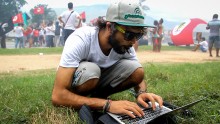Daviel Lazure Vieira
Uncovering cyber espionage campaigns by disclosing major security flaws in our phones. Revealing malware operations targeting the Syrian opposition. Helping Canadians understand how to protect their data and ensure their privacy online. For over a decade, researchers at the Citizen Lab at the Munk School of Global Affairs have been working tirelessly to expose potential threats emerging from the intersection of digital technology, human rights and global security. Led by Ron Deibert, Citizen Lab’s goal is to unveil how the very same technologies that can accelerate democratic change can also be used to restrict individual liberties through censorship, surveillance, and information warfare. “I feel as though we are serving a kind of early warning function for civil society in the same way that state intelligence agencies are supposed to provide such a warning for governments,” explains Deibert.
In 2013, Deibert wrote Black Code, an informative yet accessible account of the research conducted at the Citizen Lab. “The experiences of these research efforts were the perfect vehicle to tell stories that would at the same time inform the public about what is going on ‘beneath the surface’ of the Internet, and which are having an adverse effect on human rights and the prospects for democracy,” Deibert recalls. The film adaptation, directed by Canadian documentary filmmaker and cinematographer Nicholas de Pencier, is premiering tonight at the Toronto International Film Festival.
Deibert was familiar with the documentary films produced by de Pencier and his wife Jennifer Baichwal, notably Manufactured Landscapes and Watermark. In fact, Deibert and de Pencier already knew each other. But the idea to adapt Black Code for the big screen came immediately after the filmmaker read the book. “I was pretty amazed by how much I didn’t know,” says de Pencier. “There were things in Ron’s book that were revelatory about the exposure we face through our electronic communications. If I’m that impressed and shocked, I thought, presumably other people will be too.”
A few weeks after their initial meeting to discuss a possible collaboration, news of Edward Snowden’s leak of classified information from the National Security Agency broke and the work of many researchers, including the Citizen Lab, was on everyone’s lips. It was yet another reason for de Pencier to do the film, which showcases the challenges that civil society organizations and researchers face when exposing certain players in that emerging digital field. “I wanted to bring the viewer to experience Ron’s concerns by travelling to places where these very abstract issues related to cyberspace impact people in non-abstract ways.”
The story he tells is one that involves Tibetan exiles under Chinese surveillance in Dharamsala, India; media activists in Brazil who share their alternative views via online platforms and Syrian citizens tortured for opposing the regime through Facebook posts. “The more we raise general consciousness towards the issue, the more people can act individually to keep the dynamics of democracy alive in the digital age,” explains de Pencier.
It is the same impetus that drives Deibert and his colleagues at the Citizen Lab. “We need to encourage a culture of curiosity about technology, to promote an ethic of experimentation, to encourage users to read terms of service, take apart their devices and understand what happens beneath the hood, and to extend that same persistent curiosity to governments and corporations,” argues Deibert. “It’s about encouraging a diligent attitude among the citizenry to digital technologies embodied by the original notion of ‘hacking’ as ‘taking things apart and experimenting with them.’ My entire career I have fought against that misappropriation of the term as ‘breaking the law.’ To be a hacker today is to be an informed and empowered digital citizen.”
Black Code screens September 13 to 16 at TIFF.
Read more about the Munk School at the Toronto International Film Festival.
September 13, 2016
